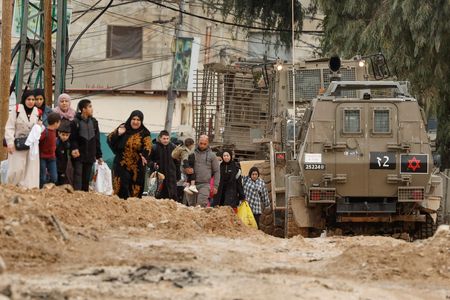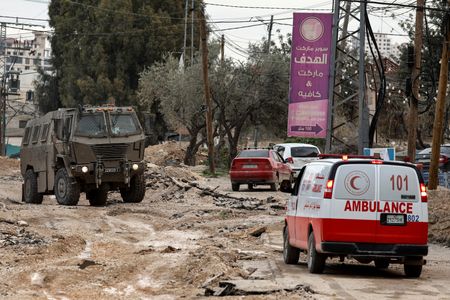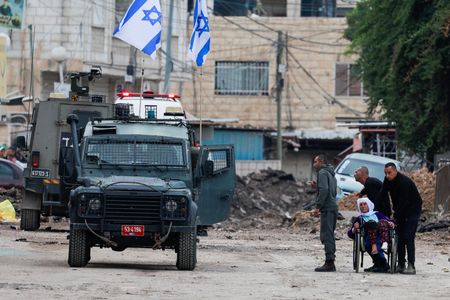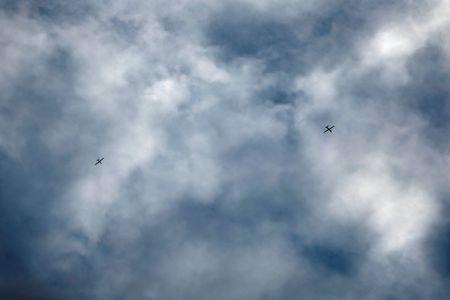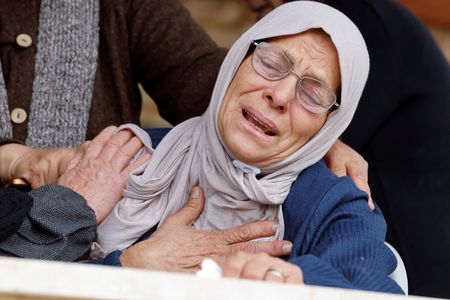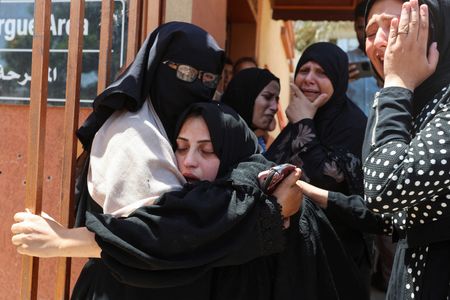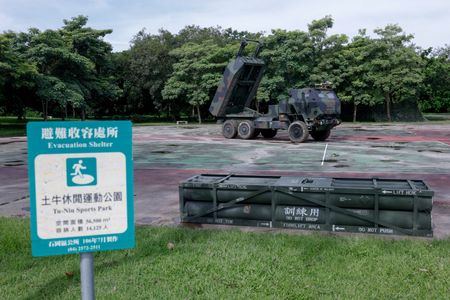By James Mackenzie, Raneen Sawafta
JERUSALEM/JENIN (Reuters) -Israel’s defence minister said on Wednesday forces were applying lessons learned in Gaza as a major operation continued in Jenin, which the military said was aimed at countering Iranian-backed militant groups in the volatile West Bank city.
A military spokesperson declined to give details but said the operation was “relatively similar” to but in a smaller area than one last August, in which hundreds of Israeli troops backed by drones and helicopters raided Jenin and other flashpoint cities in the occupied West Bank.
It was the third major incursion by the Israeli army in less than two years into Jenin, a longtime major stronghold of militant groups including Hamas and Islamic Jihad, which said its forces were fighting Israeli troops.
Residents reported constant gunfire and explosions and Palestinian health services reported at least four wounded, after 10 people were killed a day earlier.
Israeli military spokesperson Nadav Shoshani said the militants’ increasing use of roadside bombs and other improvised explosive devices were a particular focus of the operation, which included armoured bulldozers to tear up roads in the refugee camp adjacent to the city.
As the operation continued, many Palestinians left their homes in the camp, a crowded township for descendants of Palestinians who fled or were driven from their homes in the 1948 war around Israel’s creation.
“Thank God, we were at home, we went out and asked an ambulance to take us out,” said a woman who gave her name as Um Mohammad.
Before the raid, which came two weeks after a shooting attack blamed by Israel on gunmen from Jenin, roadblocks and checkpoints had been thrown up across the West Bank in an effort to slow down movement across the territory.
As the raid began, Palestinian Authority (PA) security forces pulled out after having conducted a weeks-long operation to try to reassert control over the refugee camp, dominated by Palestinian factions that are hostile to the PA, which exercises limited governance in parts of the West Bank.
The operation came just two days after the launch of a ceasefire deal in Gaza and exchange of hostages for Palestinian prisoners held in Israeli jails, with Israeli troops pulling back from their positions in many areas of the enclave.
On Wednesday, the military said troops in several areas in Gaza engaged a number of armed suspects it said posed a threat and fired warning shots at masked individuals who approached them.
It called on Palestinians to avoid approaching troops.
“The IDF is determined to fully maintain the terms of the agreement in order to return the hostages,” it said in a statement, adding that it was prepared for any scenario and would take “all necessary actions” to overcome threats.
LEARNING FROM GAZA
Defence Minister Israel Katz said the Jenin raid marked a shift in the military’s security plan in the West Bank and was “the first lesson from the method of repeated raids in Gaza.”
“We will not allow the arms of the Iranian regime and radical Sunni Islam to endanger the lives of (Israeli) settlers (in the West Bank) and establish a terrorist front east of the state of Israel,” he said in a statement.
Israel’s campaign in Gaza, following the Oct.
7, 2023, attack on Israel by bands of Hamas-led gunmen, has left much of the coastal enclave in ruins after 15 months of bombardment. The military has said it has refined its urban warfare tactics in light of its experience in Gaza, but Shoshani declined to provide details of how such lessons were being applied in Jenin.
Israel considers Palestinian militant groups such as Hamas and Islamic Jihad that are backed by Iran as part of a multifront war waged by an axis that includes Hezbollah in southern Lebanon and the Houthis in Yemen.
Newly installed U.S.
President Donald Trump has appointed a string of senior officials with close ties to the settler movement, and his return to the White House has been welcomed by hardline pro-settler ministers who have pledged to expand settlement building in the West Bank.
Around 700,000 Israeli settlers live among 2.7 million Palestinians in the West Bank and East Jerusalem, land Israel seized in the 1967 Middle East war.
Most countries deem Israel’s settlements on territory taken in war to be illegal. Israel disputes this, citing historical and biblical ties to the land.
(Reporting by James Mackenzie in Jerusalem and Raneen Sawafta in Jenin; Additional reporting by Ali Sawafta in Ramallah; Editing by Mark Heinrich and Matthew Lewis)

